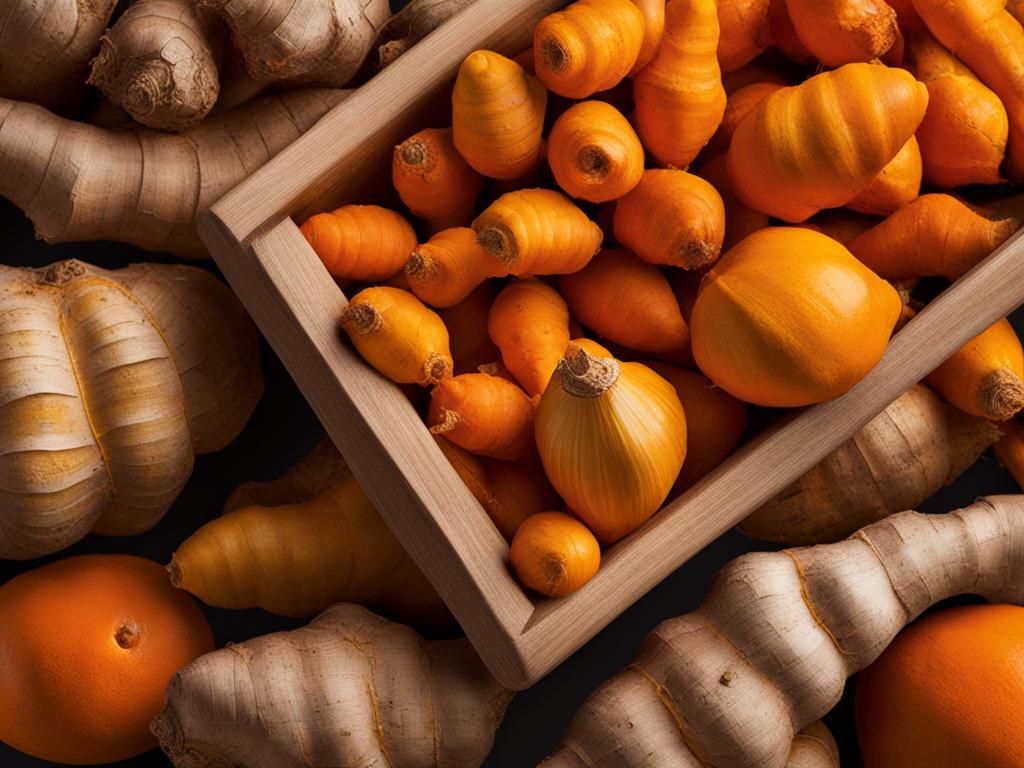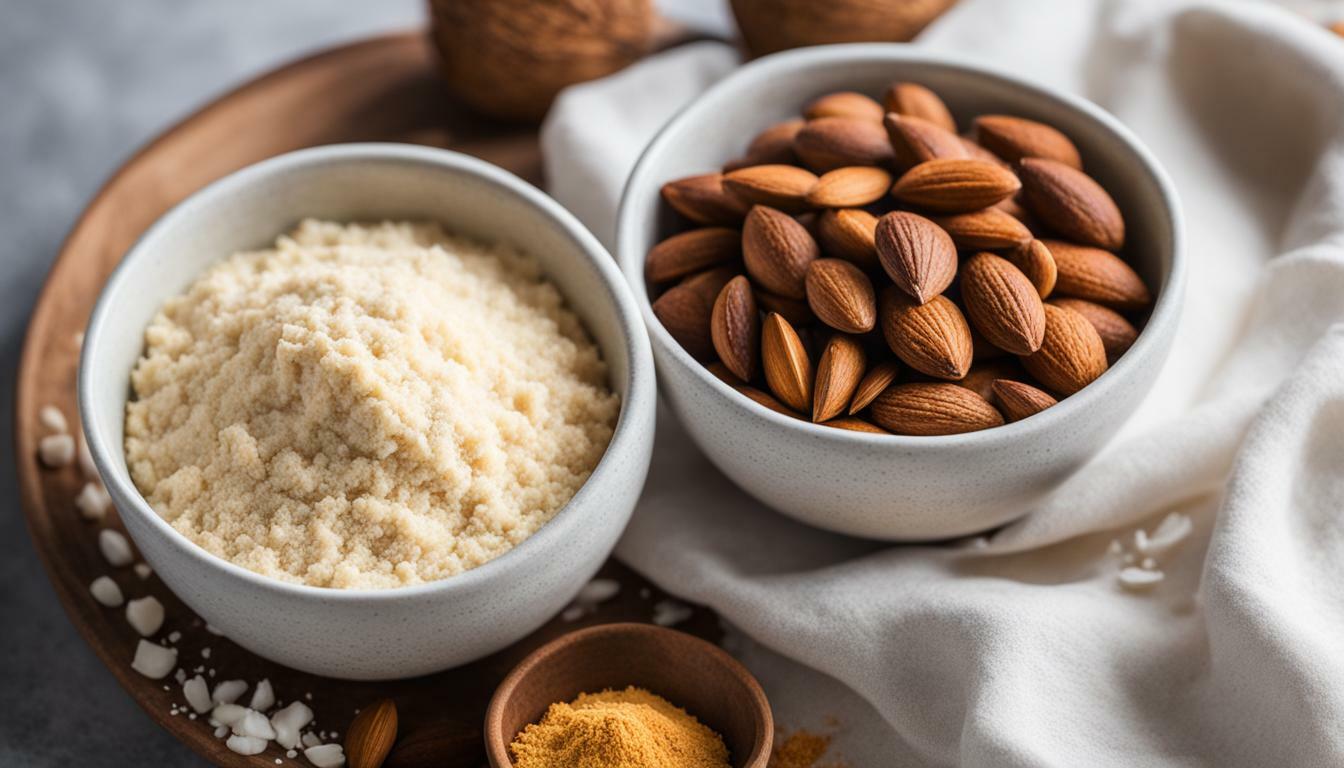Turmeric and ginger are two popular spices that are often used in cooking and praised for their health benefits. While they may seem similar, there are distinct differences between these two roots. In this article, we will explore the dissimilarities and similarities between turmeric and ginger, as well as their various uses and precautions to consider.
Key Takeaways:
- Turmeric and ginger have distinct differences in taste, appearance, and color.
- Both roots offer a wide range of health benefits due to their rich content of vitamins, minerals, and compounds.
- Turmeric is known for its anti-inflammatory properties and cholesterol-lowering effects.
- Ginger is praised for its pain-relieving abilities and digestive benefits.
- Both turmeric and ginger can be incorporated into various recipes and consumed in supplement form or as teas.
- Precautions should be taken when using turmeric and ginger, especially for individuals with gallbladder problems or those taking blood thinners.
- Consulting with a healthcare professional is recommended before using concentrated forms of turmeric and ginger.
Health Benefits of Turmeric and Ginger
Turmeric and ginger are not only flavorful additions to culinary dishes, but they also offer a wide range of health benefits. Both roots contain compounds that contribute to their medicinal properties, making them valuable additions to a balanced diet.
Anti-inflammatory Effects
Both turmeric and ginger exhibit potent anti-inflammatory effects in the body. Curcumin, the active compound in turmeric, has been shown to reduce inflammation and help with conditions such as arthritis. Ginger, on the other hand, contains gingerol, which has similar anti-inflammatory properties and can alleviate symptoms of inflammation-related conditions like osteoarthritis.
Digestive Benefits
Turmeric and ginger have long been used to aid digestion. Ginger has been found to stimulate the production of digestive enzymes, which can improve overall digestion and relieve symptoms of indigestion and bloating. Turmeric, with its anti-inflammatory properties, can help soothe the digestive system, reducing symptoms of gastrointestinal disorders such as irritable bowel syndrome.
Immune-Boosting and Antioxidant Properties
The rich antioxidant content in both turmeric and ginger helps boost the immune system and protect against oxidative stress. The compounds found in these roots, such as curcumin and gingerol, have been shown to have antimicrobial properties, which can help fight off infections and strengthen the immune system. Additionally, the antioxidants in turmeric and ginger can neutralize free radicals in the body, protecting against cellular damage and reducing the risk of chronic diseases.
| Turmeric | Ginger |
|---|---|
| Contains curcumin, which has anti-inflammatory effects | Contains gingerol, which also reduces inflammation in the body |
| Helps with indigestion and gastrointestinal disorders | Stimulates the production of digestive enzymes, aiding digestion |
| Can lower cholesterol levels and promote heart health | May help reduce blood pressure and improve cardiovascular health |
| Has antimicrobial properties, supporting the immune system | Boosts the immune system and protects against infections |
Uses of Turmeric and Ginger
Turmeric and ginger are versatile ingredients that can be used in various ways, adding both flavor and health benefits to your dishes and beverages.
When it comes to cooking, both turmeric and ginger can be used in a wide range of recipes. Turmeric adds a warm and earthy flavor to dishes and can be used in recipes such as turmeric fried eggs with kale, yogurt, and bacon, or cauliflower rice with turmeric. Ginger, on the other hand, adds a refreshing and tangy taste, perfect for dishes like ginger sweet tofu pak choi or ginger treacle sponge.
In addition to cooking, turmeric and ginger can also be consumed in other forms. You can find turmeric and ginger supplements available in the market, which provide a concentrated dose of their beneficial compounds. These supplements are often used for their anti-inflammatory and immune-boosting properties. Another popular way to enjoy the benefits of turmeric and ginger is by brewing a cup of turmeric and ginger tea. This herbal tea is known for its soothing and calming effects, making it a popular choice for relaxation and wellness.
| Culinary Uses | Supplements | Turmeric and Ginger Tea |
|---|---|---|
| Turmeric fried eggs with kale, yogurt, and bacon | Concentrated doses of beneficial compounds | Calming and soothing effects |
| Cauliflower rice with turmeric | Anti-inflammatory and immune-boosting properties | Popular choice for relaxation and wellness |
| Ginger sweet tofu pak choi | ||
| Ginger treacle sponge |
Whether you’re cooking a savory dish or brewing a cup of tea, incorporating turmeric and ginger into your diet can not only enhance the flavors of your meals but also provide you with their remarkable health benefits.
Precautions and Considerations
Turmeric and ginger are generally safe to consume and offer numerous health benefits. However, there are certain precautions and considerations to keep in mind when using these roots in concentrated forms or for specific individuals.
When Not to Use Turmeric and Ginger:
- Individuals with gallbladder problems: Concentrated forms of turmeric and ginger may not be suitable for individuals with gallbladder problems. Curcumin, found in turmeric, has the potential to worsen gallbladder issues.
- Children under 4 years old: Turmeric and ginger may be too strong for young children and should be avoided.
- Pregnant women: It is recommended that pregnant women exercise caution when consuming turmeric and ginger, as their effects on pregnancy have not been extensively studied.
- Individuals with blood disorders: Turmeric and ginger may interfere with blood clotting and should be used with caution by individuals with blood disorders or those taking blood thinners.
- Individuals using aspirin: Aspirin also has blood-thinning effects, so caution should be exercised when consuming turmeric and ginger alongside aspirin.
It is important to note that these precautions apply specifically to concentrated forms of turmeric and ginger or when consuming them in large quantities. Moderate use of these roots in culinary preparations is generally safe for most individuals.
If you have any underlying health conditions, are taking medications, or have concerns about incorporating turmeric and ginger into your diet, it is always best to consult with a healthcare professional to determine the appropriate usage and dosage for your specific needs.
| Turmeric Precautions | Ginger Precautions |
|---|---|
| Contraindications: | Contraindications: |
| Gallbladder problems | Contraindicated in individuals with hypersensitivity to ginger |
| Obstruction of bile ducts | Should not be used by individuals with peptic ulcers |
| Iron deficiency anemia | Should be used with caution by individuals with diabetes |
| Individuals taking anticoagulants | May interact with certain medications, including anticoagulants and antiplatelet drugs |
| Individuals with bleeding disorders | May lower blood sugar levels, caution for individuals with diabetes |
Remember, turmeric and ginger are best enjoyed as part of a balanced diet and should not replace medical advice or treatment. If you experience any adverse effects or have concerns, discontinue use and consult a healthcare professional.
Conclusion
In conclusion, turmeric and ginger may share some similarities, but they also have distinct differences. Both roots offer a range of health benefits, including anti-inflammatory effects and immune-boosting properties. However, it’s important to note that turmeric has a mild bitter taste, while ginger is fresh, lemony, spicy, and pungent. Turmeric has a dark yellow or orange color inside, earning it the nickname “yellow-carrot,” while ginger has a bright yellow color inside.
Despite their differences, both turmeric and ginger are versatile ingredients that can be used in various culinary creations. They can be added to tea, sauces, wok dishes, and smoothies to enhance both the flavor and the health benefits of the recipes. In addition, turmeric and ginger can also be consumed in supplement form or used to make teas.
While incorporating turmeric and ginger into a balanced diet can contribute to overall health and well-being, it’s important to exercise caution. Concentrated forms of turmeric and ginger may not be suitable for individuals with gallbladder problems, and curcumin in turmeric can potentially worsen those issues. It is also recommended to consult with a healthcare professional before using concentrated forms of these roots, especially for children under 4 years old, pregnant women, individuals with blood disorders, those taking blood thinners, or those using aspirin.
In summary, turmeric and ginger offer a wide range of health benefits and culinary uses. By understanding their similarities and differences and taking necessary precautions, individuals can enjoy the unique flavors and benefits that both these roots have to offer.
FAQ
What is the difference between turmeric and ginger?
Turmeric and ginger may look similar on the outside, but they have distinct differences. Turmeric has a dark yellow or orange color inside, earning it the nickname “yellow-carrot,” while ginger has a bright yellow color inside. In terms of taste, turmeric has a mild bitter taste, while ginger is fresh, lemony, spicy, and pungent.
What are the health benefits of turmeric and ginger?
Both turmeric and ginger offer a range of health benefits. They contain curcumin, which helps with fever, infections, and digestive problems. They also exhibit anti-inflammatory effects and are good for liver function and reducing nausea. Ginger is known for its pain-relieving properties, digestive benefits, immune-boosting effects, and its ability to fight infections. Turmeric’s benefits include lowering cholesterol, protecting against cardiovascular diseases, and reducing toothache and gum problems. Both roots are rich in vitamins and minerals.
How can turmeric and ginger be used?
Turmeric and ginger can be added to tea, sauces, wok dishes, and smoothies for their flavor and health benefits. They can also be consumed in supplement form and used to make turmeric and ginger teas. Culinary uses of turmeric and ginger are diverse, making them versatile ingredients in both savory and sweet recipes.
Are there any precautions to consider when using turmeric and ginger?
Turmeric and ginger in concentrated form may not be suitable for individuals with gallbladder problems, and curcumin in turmeric can potentially worsen gallbladder issues. These roots are also not recommended for children under 4 years old and pregnant women. Additionally, individuals with blood disorders, those taking blood thinners, or those using aspirin should exercise caution when consuming turmeric and ginger.



